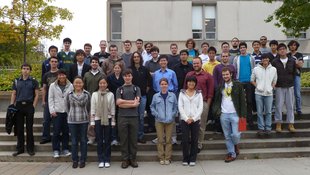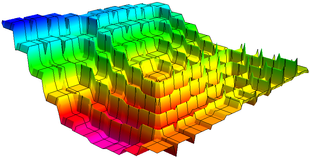| Additions to the MAT 327 web site no longer count towards good deed points
|
| #
|
Week of...
|
Notes and Links
|
| 1
|
Sep 13
|
About This Class, Monday - Continuity and open sets, Thursday - topologies, continuity, bases.
|
| 2
|
Sep 20
|
Monday - More on bases, Thursdsay - Products, Subspaces, Closed sets, HW1, HW1 Solutions
|
| 3
|
Sep 27
|
Monday - the Cantor set, closures, Thursday, Class Photo, HW2, HW2 Solutions
|
| 4
|
Oct 4
|
Monday - the axiom of choice and infinite product spaces, Thursday - the box and the product topologies, metric spaces, HW3, HW3 Solutions
|
| 5
|
Oct 11
|
Monday is Thanksgiving. Thursday - metric spaces, sequencial closures, various products. Final exam's date announced on Friday.
|
| 6
|
Oct 18
|
Monday - connectedness in  , HW4, HW4 Solutions, Thursday - connectedness, path-connectedness and products , HW4, HW4 Solutions, Thursday - connectedness, path-connectedness and products
|
| 7
|
Oct 25
|
Monday - Compactness of ![{\displaystyle [0,1]}](https://wikimedia.org/api/rest_v1/media/math/render/svg/738f7d23bb2d9642bab520020873cccbef49768d) , Term Test on Thursday, TT Solutions , Term Test on Thursday, TT Solutions
|
| 8
|
Nov 1
|
Monday - compact is closed and bounded, maximal values, HW5, HW5 Solutions, Wednesday was the last date to drop this course, Thursday - compactness of products and in metric spaces, the FIP
|
| 9
|
Nov 8
|
Monday-Tuesday is Fall Break, Thursday - Tychonoff and a taste of Stone-Cech, HW6, HW6 Solutions
|
| 10
|
Nov 15
|
Monday - generalized limits, Thursday - Normal spaces and Urysohn's lemma, HW7, HW7 Solutions
|
| 11
|
Nov 22
|
Monday -  and and  , Thursday - Tietze's theorem , Thursday - Tietze's theorem
|
| 12
|
Nov 29
|
Monday - compactness in metric spaces, HW8, HW8 Solutions, Thursday - completeness and compactness
|
| 13
|
Dec 6
|
Monday - Baire spaces and no-where differentiable functions, Wednesday - Hilbert's 13th problem; also see December 2010 Schedule
|
| R
|
Dec 13
|
See December 2010 Schedule
|
| F
|
Dec 20
|
Final exam, Monday December 20, 2PM-5PM, at BR200
|
| Register of Good Deeds
|

Add your name / see who's in!
|

See Hilbert's 13th
|
|
Reading
Read sections 23 through 25 in Munkres' textbook (Topology, 2nd edition). Remember that reading math isn't like reading a novel! If you read a novel and miss a few details most likely you'll still understand the novel. But if you miss a few details in a math text, often you'll miss everything that follows. So reading math takes reading and rereading and rerereading and a lot of thought about what you've read. Also, preread sections 26 through 27, just to get a feel for the future.
Doing
Solve and submit problems 1-3 and 8-10 Munkres' book, pages 157-158.
Due date
This assignment is due at the end of class on Monday, October 25, 2010.
Suggestions for Good Deeds
Annotate our Monday videos (starting with Video:  Topology-100927) in a manner similar to (say)
Topology-100927) in a manner similar to (say)  AKT-090910-1, and/or add links to the blackboard shots, in a manner similar to
AKT-090910-1, and/or add links to the blackboard shots, in a manner similar to  Alekseev-1006-1. Also, make constructive suggestions to me, Dror and / or the videographer, Qian (Sindy) Li, on how to improve the videos and / or the software used to display them. Note that "constructive" means also, "something that can be implemented relatively easily in the real world, given limited resources".
Alekseev-1006-1. Also, make constructive suggestions to me, Dror and / or the videographer, Qian (Sindy) Li, on how to improve the videos and / or the software used to display them. Note that "constructive" means also, "something that can be implemented relatively easily in the real world, given limited resources".
|
|
Dror's notes above / Student's notes below
|
|
Questions
1)Hi, quick question. I am wondering if the term test will cover the material on this assignment, or only the material before the assignment. Thanks! Jason.
2) In EXAMPLE 7 on page 151 Munkres claims that Rn~ is ['clearly' :)] homeomorphic to Rn:
where Rn~ consists of all sequences x=(x1,x2,x3,...) with xi=0 for i>n,
and Rn consists of all sequences x=(x1,x2,...xn).
Why are they homeomorphic ??
Thank you kindly. Oliviu.
RE: 2) Let  be defined as
be defined as  and let
and let  be defined as
be defined as  where
where  if
if  and
and  otherwise. Then both
otherwise. Then both  and
and  are continuous, because we are working in the product topology and the component functions, namely the projection function and constant function are continuous. Also
are continuous, because we are working in the product topology and the component functions, namely the projection function and constant function are continuous. Also  is a bijection because
is a bijection because  and
and  , i.e
, i.e  has a left and right inverse. So
has a left and right inverse. So  is a homeomorphism between the two spaces. Quick question is there a nicer way of writing math than using the math tag? Ian 16:03, 22 October 2010 (EDT)
is a homeomorphism between the two spaces. Quick question is there a nicer way of writing math than using the math tag? Ian 16:03, 22 October 2010 (EDT)
3)Question. Suppose we have a function f going from topological space X to Y which is not onto and a function g going from Y to Z. Could I still define the composition of f and g? i.e. g circle f? -Kai Xwbdsb 19:19, 22 October 2010 (EDT)
- If I understand your question, I don't see why not...think about
 for example.
for example.  is not onto, then let
is not onto, then let  then g compose f is
then g compose f is  - John
- John
![]() Topology-100927) in a manner similar to (say)
Topology-100927) in a manner similar to (say) ![]() AKT-090910-1, and/or add links to the blackboard shots, in a manner similar to
AKT-090910-1, and/or add links to the blackboard shots, in a manner similar to ![]() Alekseev-1006-1. Also, make constructive suggestions to me, Dror and / or the videographer, Qian (Sindy) Li, on how to improve the videos and / or the software used to display them. Note that "constructive" means also, "something that can be implemented relatively easily in the real world, given limited resources".
Alekseev-1006-1. Also, make constructive suggestions to me, Dror and / or the videographer, Qian (Sindy) Li, on how to improve the videos and / or the software used to display them. Note that "constructive" means also, "something that can be implemented relatively easily in the real world, given limited resources".

![{\displaystyle [0,1]}](https://wikimedia.org/api/rest_v1/media/math/render/svg/738f7d23bb2d9642bab520020873cccbef49768d)


















